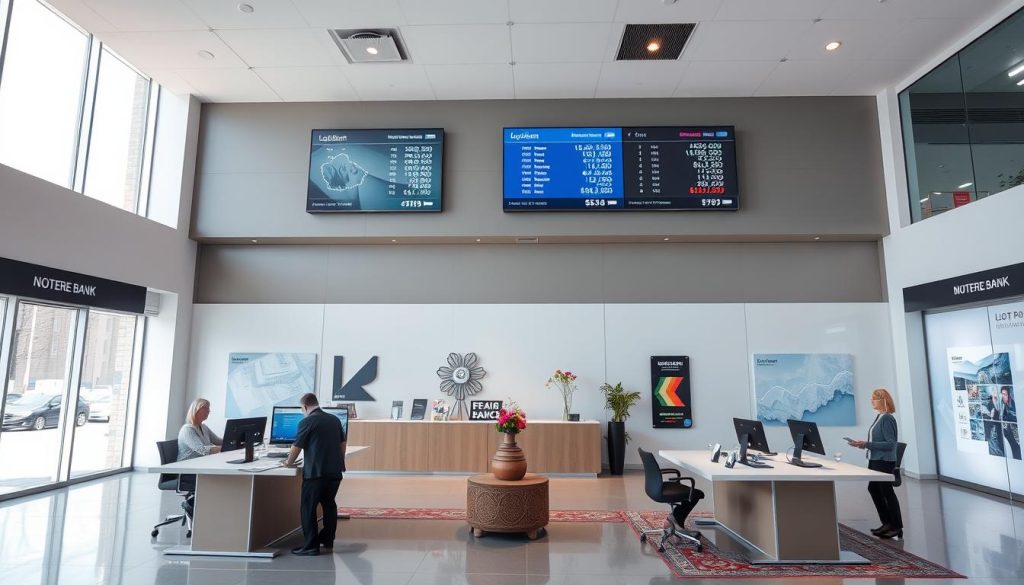UK Companies are looking to expand their reach. They need to understand Business Banking in Romania well. This part looks into Romanian Banking Insights, showing why it’s key to know the local financial scene.
By learning about the benefits of business banking, UK companies can get ready for the Romanian market. This helps them grow and succeed in this new area.
Understanding the Business Banking Landscape in Romania

The Romanian Banking Landscape is full of different financial institutions. They cater to all sorts of business banking needs. You’ll find local banks, international banks, and cooperative banks, each with their own Business Banking Services.
These banks offer everything from basic accounts to complex credit facilities. This variety means companies can find the financial solutions they need.
European Union regulations have had a big impact on Romanian banks. These rules aim to make banking more stable, transparent, and safe for customers. So, businesses can expect a banking environment that focuses on following rules and managing risks.
Local banks like Banca Transilvania and Raiffeisen Bank are big players. They offer Business Banking Services made for SMEs and big companies. These banks know the local market well, which helps businesses deal with Romania’s unique challenges.
International banks, such as UniCredit and ING, bring a global view. They often have the latest banking technologies and products. This mix of local knowledge and global support helps businesses meet their varied needs.
Knowing the Romanian Banking Landscape helps businesses pick the right financial institutions and services. This choice is key to achieving their goals.
The Importance of Business Banking for UK Companies

For UK companies looking to enter the Romanian markets, business banking is key. It’s not just about making transactions. It’s about the strategies that help businesses grow and succeed.
Benefits of Expanding into Romanian Markets
The Romanian market offers many benefits for UK companies. Some of these include:
- More market access through banking channels.
- Diversified income from a growing economy.
- More chances for business growth and innovation.
Strategic Financial Planning for Businesses
Good financial planning is vital for long-term success. Having strong banking relationships helps manage money better and work more efficiently. UK companies in Romania can get:
- Custom financial products that fit their needs.
- Help with local regulations.
- Chances to network and partner, making businesses stronger.
Key Features of Romanian Business Banking Services

Romanian banking services are designed for businesses of all sizes. They offer a wide range of products. This helps companies make smart choices about their finances and growth plans.
Account Types and Their Functions
Businesses can choose from different types of business accounts. Each type is made for specific needs. Here are the main ones:
- Current Accounts: Perfect for everyday transactions and handling payments.
- Savings Accounts: Great for saving money and earning interest.
- Specialised Business Accounts: Made for certain industries or activities, offering extra features.
Loan Opportunities for Businesses
Business loans are key for growth or managing costs. Romanian banks offer many financing options:
- Working Capital Loans: Assist with daily costs and cash flow management.
- Investment Loans: Fund long-term projects to boost growth and profits.
- Other Financing Options: Such as equipment financing and trade finance, for flexible capital use.
Business Banking in Romania: Regulatory Framework

The rules for business banking in Romania are key to keeping the financial system stable. The Romanian Banking Laws set out how banks should work. They cover things like money needed, managing risks, and protecting customers.
The National Bank of Romania is very important in banking rules. It makes sure banks are healthy. For UK companies starting in Romania, knowing the rules is crucial. Following these rules helps keep investors confident.
Businesses need to understand these laws to avoid problems. Knowing the rules helps them work well and meet what regulators expect.
Choosing the Right Bank for Your Business

Choosing the right bank is key for UK companies in Romania. The right bank helps with smooth money transactions and boosts business success. It’s important to think about what you need and what you want to achieve.
Factors to Consider When Selecting a Bank
When picking a bank, think about these key points:
- Reputation in the market
- Range of services offered
- Customer support accessibility
- Geographical presence and branch network
- Suitability for your business type
Understanding Bank Fees and Services
Understanding Bank Fees Romania is crucial. Fees can differ a lot between banks. Look at these:
- Account maintenance fees
- Transaction fees for business operations
- Currency exchange charges
- Loan service costs
Setting Up a Business Bank Account in Romania

Setting up a business bank account in Romania has several key steps. It’s important to know the banking procedures well. You’ll need your company registration, ID for directors, and proof of address.
Also, you might need to make an initial deposit. The amount can differ by bank. Always check what your bank needs before you start.
Foreign companies might find it tough, due to language or local rules. Here are some tips to help:
- Get a local legal advisor who knows Romanian banking.
- Have all your documents ready.
- Go to the bank in person to talk things over.
- Be prepared to share lots of details about your business.
Knowing what to do can make setting up a business bank account easier. It helps you start off right with your banking in Romania.
Digital Transformation in Romanian Banking

The banking sector in Romania is changing fast, thanks to new technology and what customers want. Fintech companies are bringing fresh ideas to banking. They make things better for businesses in the area.
The Role of Fintech in Business Banking
Fintech is changing business banking in Romania. It offers many services that help businesses grow. These include:
- Faster transaction processing.
- Enhanced analytics and reporting tools.
- Improved customer support through automated systems.
- Customised financial products tailored to specific business needs.
So, businesses can handle their money better. This helps them stay ahead in a changing market.
Mobile Banking Solutions for Businesses
Mobile banking is key in Romania’s digital banking. It lets businesses manage their money easily and safely. Mobile banking solutions include:
- Real-time access to account information.
- Easy fund transfers between accounts.
- Mobile payment options for greater flexibility.
- Alerts and notifications for transaction activities.
This move to mobile banking makes things better for businesses. It meets the needs of customers who want quick and easy banking. As digital banking grows, both banks and fintech will shape the future of business banking.
Expectations from Romanian Business Banking Partners

UK companies working with Romanian banks need to set clear Banking Expectations with their Business Banking Partners. A good partnership relies on effective Relationship Management. This means keeping communication open and understanding each client’s needs well.
Here’s what companies can expect from their banking partners:
- Quick answers to questions and requests, making operations smoother.
- Active help in understanding the unique challenges of the market.
- Support that fits the specific industry and business goals.
- Clear information about the banking products and services offered.
Banks that adapt to market changes and client needs are key to strong relationships. Meeting Banking Expectations helps UK companies succeed in Romania’s fast-changing economy.
Common Challenges in Business Banking in Romania

UK businesses face many challenges in Romania’s banking sector. These hurdles can make it hard for them to work well in this changing financial world. Knowing these common problems helps entrepreneurs find ways to reduce risks and succeed.
Navigating Language Barriers
Language barriers are a big challenge in Romanian banking. Even though many bankers speak some English, complex financial talks need a better grasp of specific terms. This can cause misunderstandings about financial products and services. Businesses should think about the following steps:
- Investing in translation services for legal and financial documents.
- Engaging bilingual consultants who know the banking system and local terms.
- Doing some research to understand common banking terms in Romanian.
Adapting to Local Banking Practices
It’s crucial to understand the cultural and banking practices in Romania for business success. UK companies often find that Romanian banking is very different from what they’re used to. Knowing these differences can help avoid problems:
- Learning about local regulations and compliance standards.
- Building relationships with local bankers who can share insights into expectations and procedures.
- Getting used to the Romanian way of customer service, which values personal relationships more than formal processes.
Investment Opportunities through Romanian Banking Systems

The Romanian banking systems offer a range of investment opportunities. UK businesses can use these to diversify their portfolios and increase returns. Working with local banks can help access various financial instruments tailored to different needs.
Key investment vehicles available through Romanian banks include:
- Bonds: These fixed-income securities provide a stable return over time and are issued by both the government and corporations.
- Mutual Funds: These pooled investment funds enable investors to benefit from a diversified portfolio managed by financial professionals.
- Stocks: Direct investment in local companies can yield significant returns, especially in sectors experiencing growth.
- Real Estate Investment Trusts: These allow investors to engage in the real estate market without the need to manage properties directly.
Understanding the Romanian market is key to finding the best investment opportunities. Working with local banks helps craft strategies that meet company goals while managing risks. These strategies can lead UK businesses to successful and profitable investments in Romania.
Customer Support and Services in Romanian Banks

Good customer support is key in Romanian banking. For UK companies in the area, knowing about Romanian bank support is crucial. It’s all about quick help and solutions that fit each client’s needs, especially for those from abroad.
Availability of English-speaking Representatives
Many Romanian banks have English-speaking staff. This makes banking easier for those who don’t speak Romanian. You can find these representatives through:
- Dedicated phone lines for English-speaking customers.
- Email support for international business questions.
- Social media for quick chats with clients.
Online banking is also big in Romania. It lets businesses check info, manage accounts, and make transactions whenever they want. Banks offer special services for international clients, showing their dedication to quality service.
Future Trends in Business Banking in Romania

The Romanian Banking Sector is set for big changes, thanks to EU Regulations. These rules will influence how banks work, what they need to do, and what customers want. It’s important for UK companies to understand these shifts if they want to grow in Romania.
Impact of European Union Regulations
EU Regulations are key in shaping the future of business banking in Romania. They affect several areas:
- More focus on digital services, with banks using new tech to improve their offerings.
- Tighter rules to protect customers and keep the market fair.
- Changes in how people want to bank, with a move towards online and mobile services.
As these changes happen, businesses need to stay flexible. They must make sure their banking plans fit with the new rules and trends.
Building Relationships with Romanian Banking Institutions

Building strong ties with Romanian banks is key for business success. It boosts service quality and opens up special opportunities. Working with local bankers gives a more personal banking experience and access to custom financial solutions.
Networking with Local Bankers
Creating a strong network is vital for success in Romania’s financial scene. Networking with Romanian banks helps businesses connect with key players who know the local market well. Here are some ways to network effectively:
- Attend local financial seminars and workshops to meet professionals.
- Join business associations that focus on the Romanian market.
- Engage on professional networking platforms to identify key bankers.
- Participate in social events that include bankers and financial experts.
Using these strategies can increase a company’s visibility and credibility. This leads to better interactions with Romanian banks.
Leveraging Insights for Effective Banking Strategies

Learning from UK companies in Romania can teach us a lot. By looking at case studies, we can find the best banking strategies for the Romanian market. These examples show how to succeed in Romania’s financial world.
Case Studies of Successful UK Companies
Many UK companies have done well in Romania. They’ve found ways to make their banking work better. Here are some key points from their experiences:
- Building strong connections with local banks fosters trust and enhances chances for secured financing.
- Understanding Romanian banking regulations aids in the strategic planning of financial transactions.
- Leveraging digital banking solutions streamlines operations, making it easier to manage finances efficiently.
- Investing time in financial education and local knowledge improves decision-making and long-term sustainability.
By using these lessons, UK companies in Romania can make their banking strategies stronger. Looking into these insights is key for businesses wanting to succeed in Romania’s banking system.
Best Practices for Managing Business Finances in Romania

For UK companies in Romania, managing finances well is key. It makes operations smoother and helps follow local rules. Knowing how to handle finances in Romania is crucial for success.
Financial Compliance and Legal Requirements
Keeping up with financial rules is important. Businesses need to pay close attention to local laws. Here are some key areas to focus on:
- Accurate financial record-keeping to support transparency and accountability.
- Timely submission of tax returns to meet local obligations.
- Understanding employee taxation and contributions to ensure compliance with labour laws.
- Implementing effective internal controls to reduce the risks of financial discrepancies and fraud.
- Staying informed about regulatory changes that impact financial reporting and compliance.
By following these best practices, UK companies can do well in Romania. They will also meet all financial compliance rules.
Resources for UK Companies Engaging with Romanian Banks
For UK companies looking to enter Romania, finding reliable resources is key. Government websites offer vital info on rules and banking steps. This helps businesses get ready for the local financial scene.
UK firms can also reach out to banks that help international companies. These banks offer special services for foreign businesses. With the right tools and support, companies can better understand Romanian banking.
Online platforms can also help with business and finance. They make transactions and talking to banks easier. With the right tools, working with Romanian banks can be smooth, helping businesses grow.

